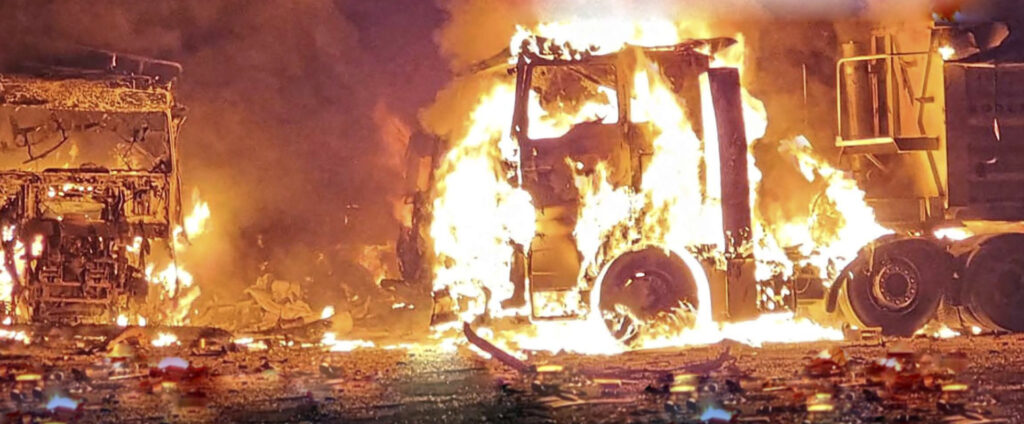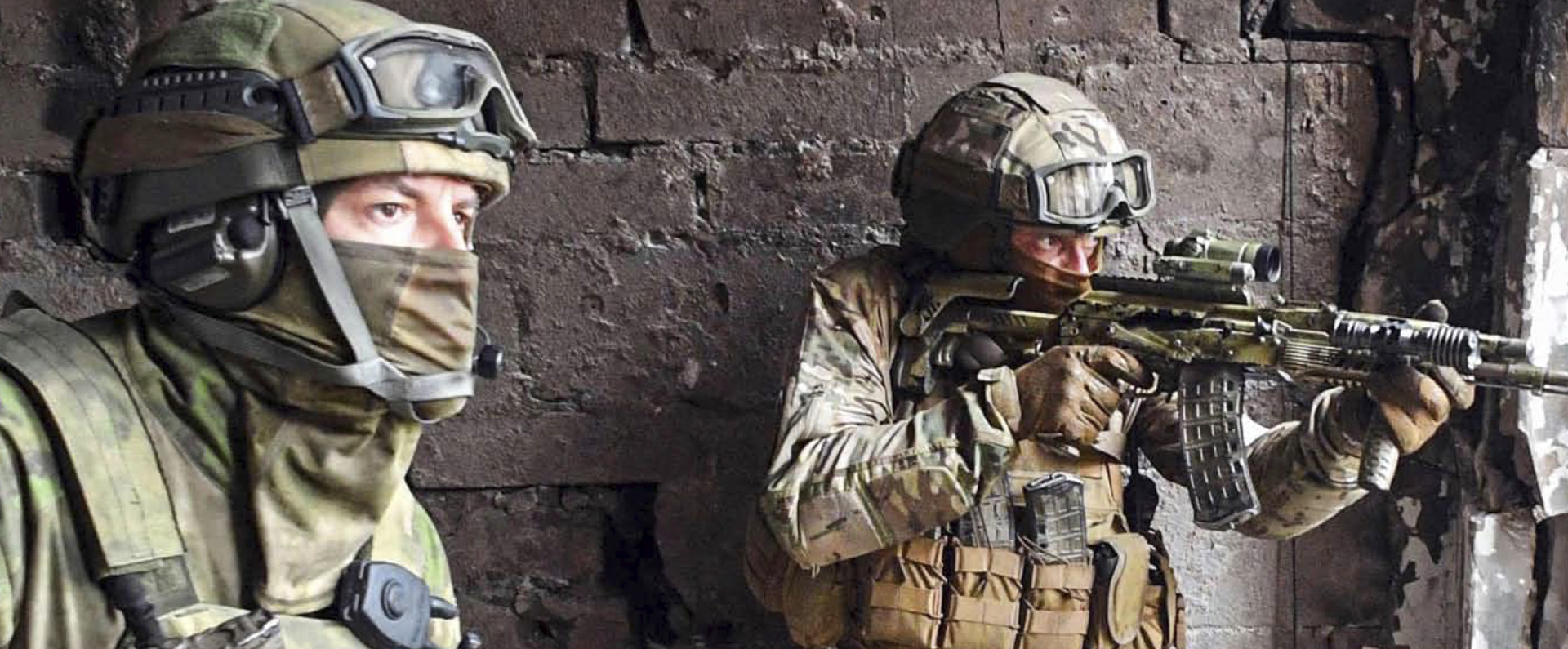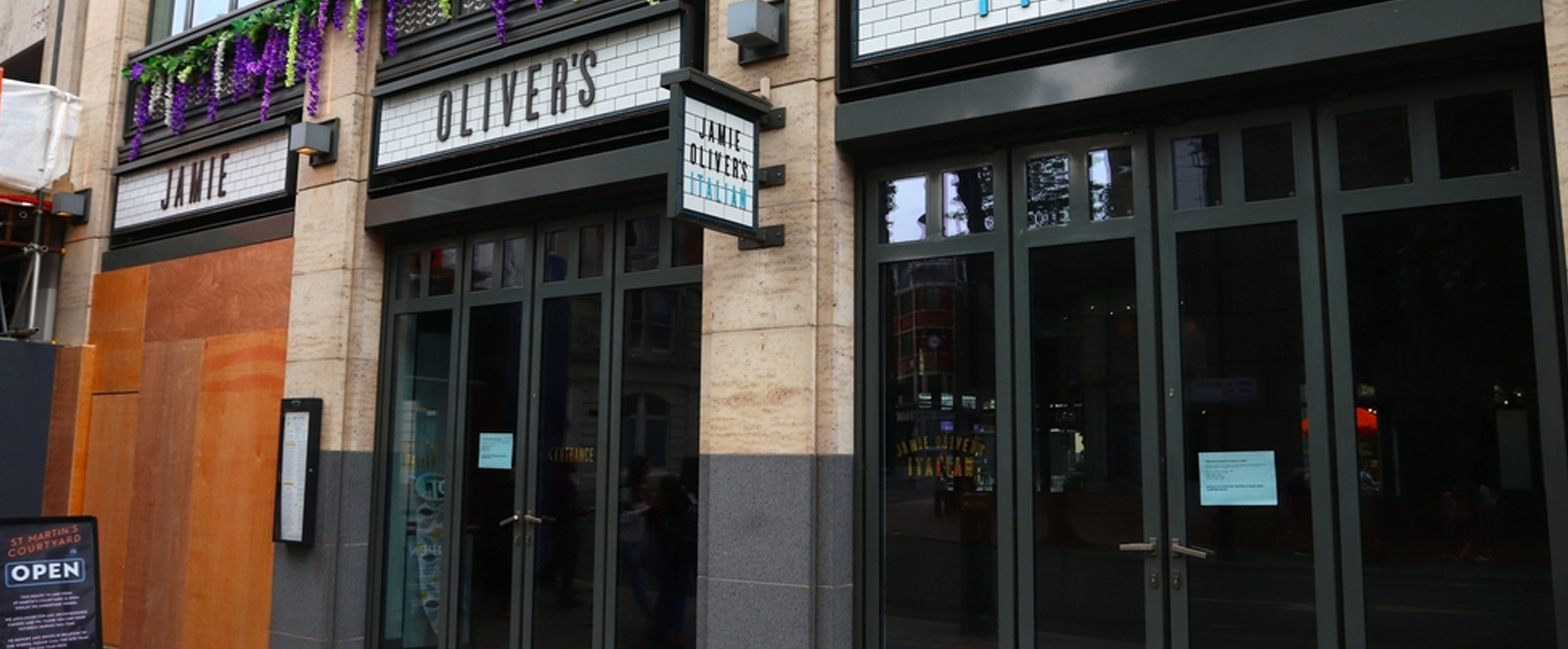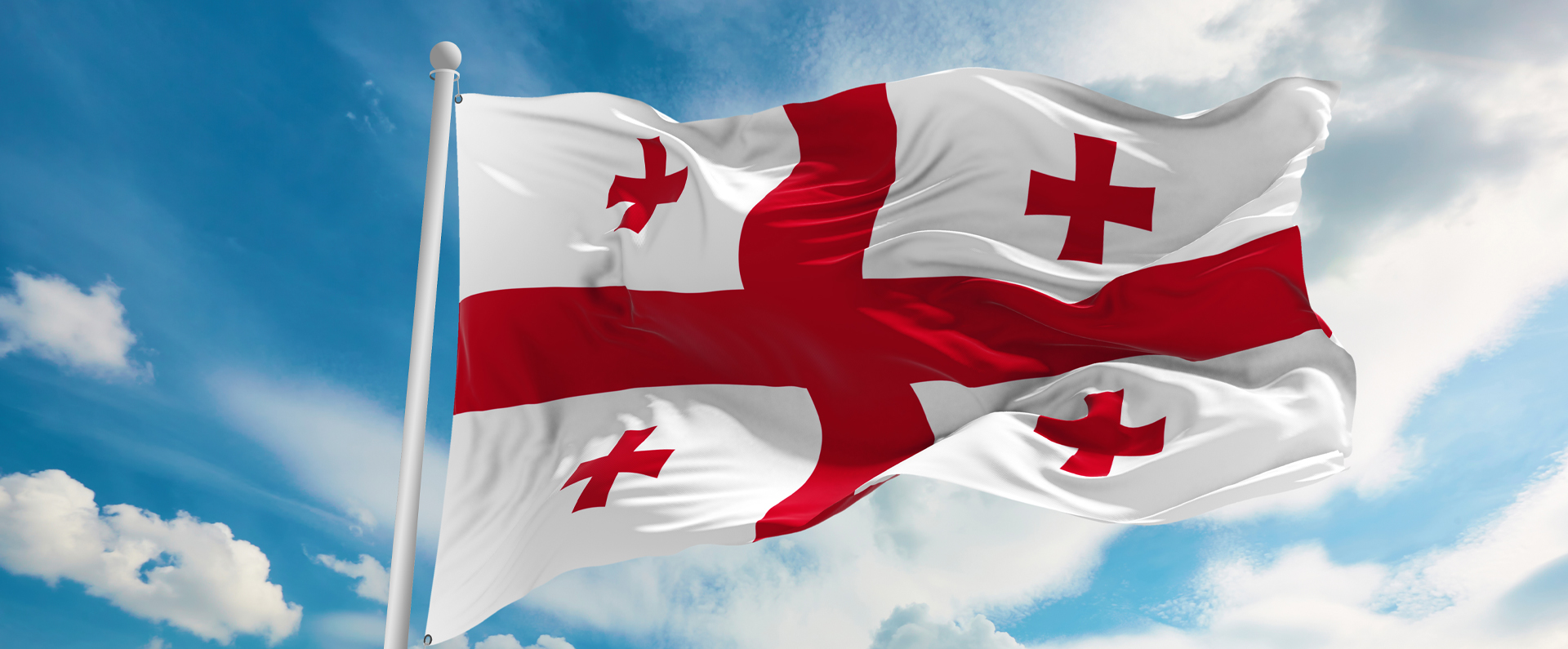
Published in The Mail on Sunday on 05 November 2023.
The uplifting story of how a Macclesfield farmer and an ex-Royal Marine are among selfless volunteers taking aid convoys to war-torn Ukraine is revealed by LORD ASHCROFT
At the makeshift memorial to his fallen comrades, Captain Serhiy Zvyahin paused, bowed his head and reflected on one of the most savage battles of the war in Ukraine.
Unsurprisingly, the decorated officer was deeply moved as he stood on the edge of a wood amid seemingly endless bouquets of flowers and with a host of Ukraine’s blue and yellow national flags fluttering in the breeze.
Furthermore, framed and unframed photographs of many of the 70 soldiers from his unit, 72nd Mechanised Brigade, who died in the two-week battle for Moshchun were placed on the ground and pinned to trees. Together with the nearby ruins of hundreds of homes and scores of burnt-out vehicles, the grim scene had forced the officer to recall harrowing images from March last year.
Despite surviving that ferocious onslaught near Bucha – resistance that repelled the Russian forces as they neared the Ukrainian capital of Kyiv – Zvyahin has another constant reminder of a later battle: his prosthetic limb.
The captain’s right leg had to be amputated above the knee after he was seriously wounded by an artillery shell as he raced to recover the body of an army commander close to the front line last October.
Zvyahin lost more than two litres of blood, but he saved his own life by tying a tourniquet to his severed limb as well as administering pain relief and a clotting agent as he lay on the battlefield. After 15 minutes, still conscious but in deep shock, he was medevac’d out and later operated on.
Unable to be a frontline soldier because of his disability, he was given the opportunity of leaving the army. He rejected it and now trains 450 youngsters aged 16 to 18 on an officers’ training course in western Ukraine. ‘The army has been my life for 12 years and I hope I can pass on my experience and knowledge to the next generation of soldiers so that Russia can be defeated,’ Zvyahin, 35, told me.
I was privileged to meet the captain, broad-shouldered with cropped, greying hair, and many more war heroes two weeks ago when I visited Ukraine for the fifth time since the war last year.
My trip – which took in Zaporizhzhia, Kramatorsk, Odesa and other cities near the front line – followed an invitation by former British servicemen who have been repeatedly risking their lives by taking vital supplies to the war-torn country. Supported by scores of civilians, two British voluntary groups – Macclesfield Ukrainian Aid and the Ukraine Freedom Company – typically make monthly visits to the Eastern European country in aid convoys.
I was part of a seven-vehicle, 16-person convoy delivering potentially life-saving supplies to civilian and military groups. Distances in Ukraine – Europe’s second-largest country – are vast and we drove approaching 2,000 miles in total, up to 13 hours a day over five days.
This determined ‘band of brothers’ – and ‘sisters’ – started from the Cheshire town of Macclesfield, rendezvousing with a group from Salisbury, Wiltshire, before crossing the Channel. Many on the convoy had already been travelling for four days when I caught up with them in Lviv, a city in western Ukraine close to the Polish border.
Each team member has a common goal: they wanted to support Ukraine in its hour of need.
This led to the formation of the two groups – both non-profit companies seeking charitable status – that now pool resources.
Typically, the groups deliver medical supplies, 4×4 vehicles, vans, generators and other equipment to those most in need, including frontline soldiers. Today, as winter approaches, the soldiers’ requirements, such as winter uniforms – to counter temperatures that will fall as low as -20C – are more urgent than ever.
There were tales of heroism at the 12 drop-off points the convoy made. ‘Hades’, his military call sign, who is British but who does not want his real name used for security reasons, moved to Ukraine 11 years ago after serving in the Royal Artillery for 24 years. He ran an extreme sports company and was in a relationship with a Ukrainian woman, though they separated and she lives with their son in Kyiv.
After the full-scale war began, Hades joined the Ukrainian army. Initially he fought in an infantry unit but soon he was commanding a Special Forces unit.
Time and again he has been operating on the front line, helping with the liberation of the port city of Kherson and also deep behind enemy lines.
Today he serves as a major and his unit is some 50-strong, almost double in size from earlier in the war. However, since the war began he has seen 34 of his comrades in his two fighting units killed, and many others wounded. ‘It is a lot of men to lose, heartbreaking at times,’ he told me.
Hades had to hold back tears as he talked about some of the evidence of Russian atrocities he had seen, including the torture of an entire Ukrainian family. However, he was nevertheless thrilled to receive medical supplies and two pick-up trucks from the convoy.
I was particularly delighted that the convoy also dropped off supplies to the Tsunami Assault Regiment in Odesa and 92 Brigade in Kramatorsk, because I had met the commanders of both units on my previous visit to Ukraine in September. Sergiy Tetyukhin, the deputy mayor of Odesa, accepted the first batch of 200 winter uniforms on behalf of the Tsunami unit, while Yurii Fedorenko, the commander of 92 Brigade, took other key supplies for his men.
Our aid convoy was led by Rick Mobbs, 61, the field operations director and a trustee for Macclesfield Ukrainian Aid. The group has organised 23 convoys and Mobbs has been on 13 of them.
A builder and farmer who lives near Macclesfield, he told me: ‘I had a cocktail of reasons for wanting to get involved.
‘First, there was a moral component: I thought what the Russians had done was very wrong.
‘Second, I was a Cold War soldier who served nine years in the Army and I felt I had unfinished business with Russia.
‘Third, my son married a Ukrainian and so I have grandchildren who are part-Ukrainian, while I also have Ukrainian friends from before the war who needed help.’
Mobbs and Tom Jackson, who with family members founded Macclesfield Ukrainian Aid, try to give a ‘meaningful volunteer experience’ to those on the convoy and the group’s other supporters.
Businessman Jackson, 40, got involved immediately after the invasion, partly because his mother, Anne, is half-Ukrainian. He has been on 16 of the convoys.
‘On the day of the invasion, I ran to my mother’s house, as she lives next door, and we were all gobsmacked by what was going on. We decided there and then to start a humanitarian hub for gathering aid. Within a week we had 68 volunteers turning up and it took off from there,’ he said.
‘Then we had the task of taking the huge supplies of aid out to Ukraine, so we contacted hauliers and within six weeks sent out five articulated lorries full of supplies. We really do make a difference and it is hugely rewarding work.’
Macclesfield Ukrainian Aid has delivered more than £3million worth of medical supplies alone, on top of a huge array of other goods, while donations from the public are approaching the £1million mark.
The Ukraine Freedom Company was formed early last year, primarily to help military units in Ukraine. Tim Anstee, 63, is a businessman who had served in the Royal Marines and the Reserve for eight years.
He told me: ‘After the invasion, I felt Ukraine was fighting the war we had been trained to fight in the late 1970s and early 1980s.
‘Rather than sit on my backside and watch the news, I felt compelled to get involved.’
Anstee has organised ten convoys delivering aid and critical medical supplies. Speaking on his third convoy to Ukraine, he added: ‘By forming the Ukraine Freedom Company, we are providing a framework for those who want to help Ukraine but don’t know how to go about it.’
Marcus Dixon, 66, Anstee’s co-director, who served in the Army and Reserve for ten years, was on his fourth aid convoy to Ukraine. He said: ‘I initially announced rather grandly to my long-suffering wife, Diana, that I was going to join the Ukrainian army.
‘She sat me down in the kitchen and said, “You do realise, you are over retirement age, you have a shaky leg, you are on blood thinners and you are not very fit?” So I listened to common sense and I started taking critical aid supplies to Ukraine instead.’
Dixon, who, like Anstee, lives in Dorset, added: ‘This war feels like the one we were training for in the 1980s, only 1,000 miles further east and 40 years later.’
Few, if any, volunteers have more empathy for Ukrainians than Belma Velic, 42, a technology business consultant from Harrogate, North Yorkshire, who was on her second convoy two weeks ago, working to help organise the trip and as a volunteer driver.
She told me: ‘My inspiration for getting involved comes from a deep sympathy for the people of Ukraine. As an 11-year-old, I and my family went through something similar during the siege of Sarajevo when Serbia invaded Bosnia and began ethnic cleansing Croats and Bosnian Muslims.
‘We experienced shelling, artillery fire and were held hostages by a Serbian private mercenary army during a UN-backed women and children’s convoy. Understanding first-hand about living under that sort of tension and fear, and what it means to lose your basic freedoms, I felt it my duty to help the people of Ukraine.
‘So when the opportunity arose, I jumped at the chance to help the two voluntary groups.’
As I crossed the border back into Poland, I felt both humbled and uplifted by my experiences over the previous five days. I have no doubt that the likes of Captain Serhiy Zvyahin, Hades and the many other war heroes I met during my visit will prevail against their aggressors.
I am convinced, too, that their victory is all the more certain now they have witnessed the unstinting support of an equally determined ‘band of brothers’ from Britain who will never allow evil, brutality and greed to triumph over goodness, compassion and selflessness.
For more information on Macclesfield Ukrainian Aid, including how to donate, visit ukrainianaid.org.uk. For more information on the Ukraine Freedom Company, including how to donate, visit ukrainefreedomcompany.org
Read this article on:
DailyMail.co.uk


